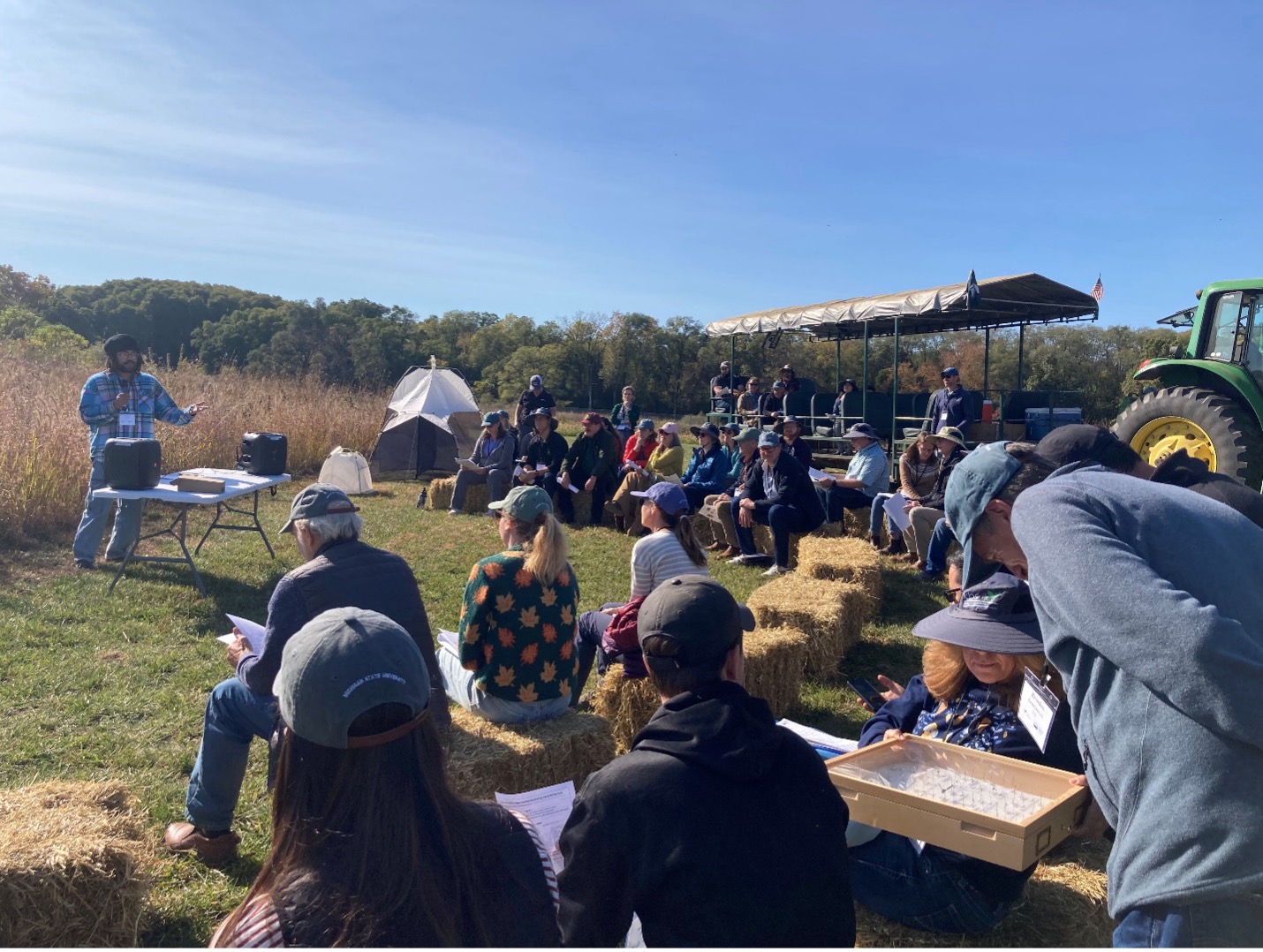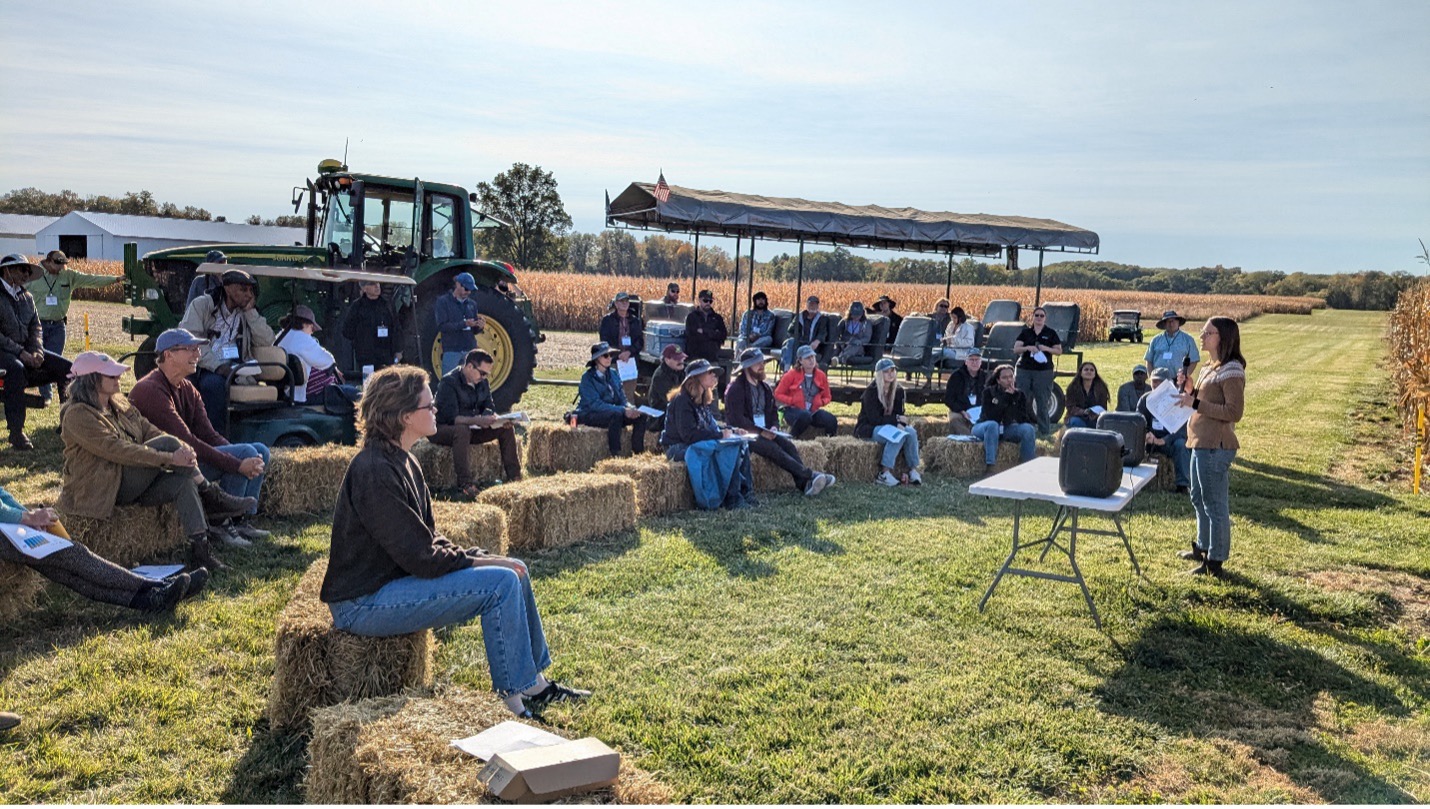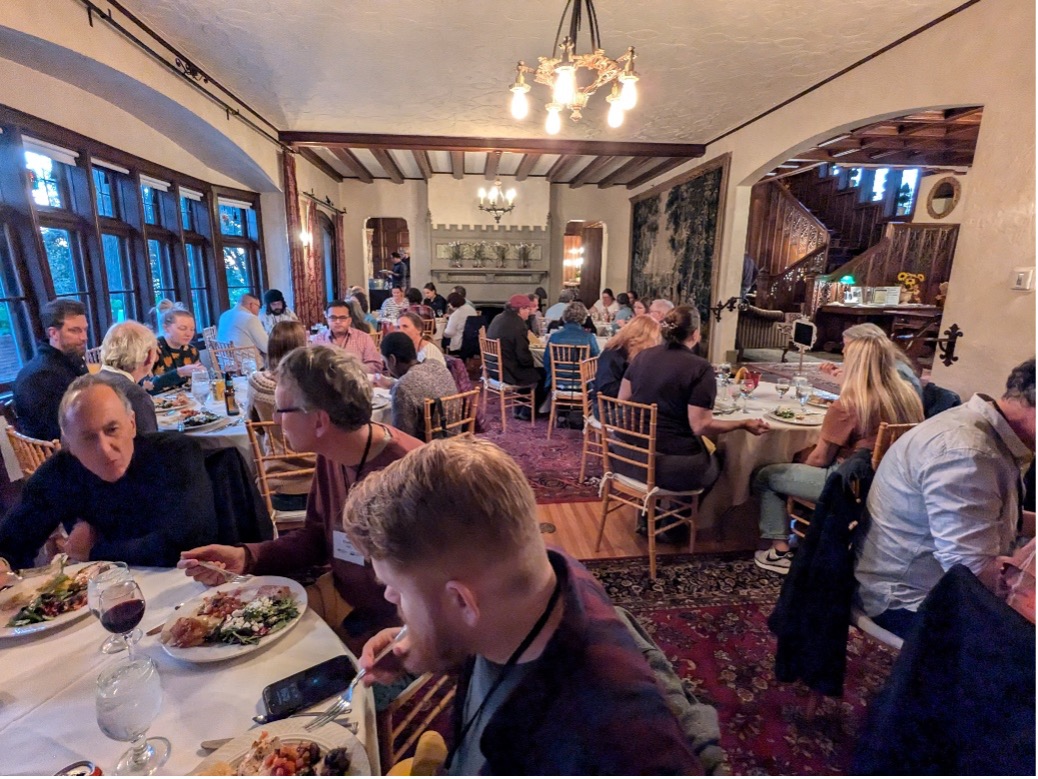KBS LTAR hosted the Annual LTAR Leadership and Data Managers Meeting
From October 17th to 19th, KBS LTAR hosted the Annual Leadership Meeting alongside the Network Data Managers meeting, uniting site leads to enhance the Network's strategic plan focused on building capacity.

On October 17th-19th the KBS LTAR hosted the annual LTAR Leadership meeting, coincident with a meeting of Network Data Managers. This leadership meeting brought together site leads from across the network to work on a major part of the Network’s strategic plan - building network capacity. Discussions centered on improving network coordination, growing stakeholder engagement, and defining metrics of success. Data Managers from across the Network met to be introduced to Socrata, the Network’s new data management platform for organizing and sharing data across Common Experiments and for cross-site syntheses. Consistent and rigorous protocols scaled across many regions can support science that informs national-level policies to improve our agroecosystems.
 Data managers hard at work learning how to use the new Socrata platform to organize and store data from 19 sites across the country.
Data managers hard at work learning how to use the new Socrata platform to organize and store data from 19 sites across the country.
The meetings included a half-day field tour of the KBS LTAR Aspirational Cropping Systems Experiment (ACSE). KBS LTAR scientists and stakeholders shared their experiences and science stories with over 40 tour participants. Four members of our Stakeholder Advisory Board, Laura Campbell (Michigan Farm Bureau), Kristin Poley (Corn Marketing Program of Michigan), Christine Charles (MSU Extension), and Jason Stegink (Wide Angle Agriculture) described how the KBS LTAR is valuable to their work. Both Laura and Kristin noted the importance of ACSE research for Michigan agriculture. Kristin, for example, shared that “The LTAR is able to demonstrate aspirational cropping practices and research over multiple years and at scale, which we can then use as a showcase to farmers and other stakeholders. Importantly, the research at the KBS LTAR allows us to answer research questions that a commodity checkoff program doesn’t have the resources to investigate.”
Other highlights from the field day speakers included:
- Christine Charles - MSU Extension Regenerative Agriculture Educator & KBS LTAR Stakeholder Advisory Board member
- The KBS LTAR creates an annual per acre financial summary, highlighting that diverse crop rotations (like at KBS including canola and forages) can have variable profitability in early years, and that this information can hedge expectations on integrating new crops.
- Christine Sprunger, MSU Associate Professor of Soil Health and Ecosystem Ecology, and Tvisha Martin, MSU PhD Candidate
- Soil nematode communities can serve as early indicators of soil health, and early results show that integration of small grains can reduce abundances of plant-parasitic nematodes after the first year.
- Hannah Burrack, MSU Entomology Department Chair and DeShae Dillard, MSU Entomology PhD Candidate
- They are working to piloted methods to sample insects that could be scaled across the network (e.g. pheromone traps, and soil emergence tents). Notably, at the KBS LTAR, they found canola pests at levels greater than recommended thresholds and significant slug damage in soybeans. This inspired conversations about how integrated pest management could be scaled across sites in the network
 DeShae Dillard, a graduate student working at the KBS LTAR, shared how he’s studying changes in fly populations in the KBS LTAR Common Experiment. Participants look at a sample of the specimens he’s collected.
DeShae Dillard, a graduate student working at the KBS LTAR, shared how he’s studying changes in fly populations in the KBS LTAR Common Experiment. Participants look at a sample of the specimens he’s collected.
- Sandy Marquart-Pyatt, MSU Professor in Sociology & Environmental Science & Policy
- The Farmer Panel Survey, a self-administered mail survey that has been conducted annually since 2017 of ~2,000 producers in 4 states (IL, IN, MI, OH) farming at least 100 acres informed the design of the KBS LTAR business-as-usual treatment. The KBS LTAR also uses iterative stakeholder surveys to evaluate perceptions of the KBS LTAR treatments over-time.
- Jason Stegink, Owner of Wide Angle Agriculture, KBS LTAR Crop Advisor, & KBS LTAR Stakeholder Advisory Board member
- Collaboration with a Certified Crop Advisor provides several benefits to the KBS LTAR, including bench marking with local agriculture, informing BAU and ASP management, and crop specific documentation for management.
- Bruno Basso, MSU John A. Hannah Distinguished Professor in Earth and Environmental Science & Blair Van Agen, MSU Masters Student
- The KBS LTAR Aspirational treatment uses precision agricultural technology, including variable-rate nitrogen (N) applications based on yield stability maps, in-season remote sensing imagery, and N recommendations derived from the SALUS process-based simulation model. These efforts informed the placement of prairie strips in low-productivity areas in the Aspirational treatment.
- Jenn Blesh, University of Michigan Associate Professor
- Participatory, on-farm research is an essential complement to long-term experiments to inform adapting management to distinct contexts (e.g., soil properties explain variation in cover crop performance across farms). Early findings show that functionally-diverse cover crop mixtures can recycle and supply substantial quantities of nitrogen, while also increasing other key benefits.
 Dr. Jenn Blesh from the University of Michigan talks with the group about her work studying how cover crops can improve system nitrogen use efficiency.
Dr. Jenn Blesh from the University of Michigan talks with the group about her work studying how cover crops can improve system nitrogen use efficiency.
- Nick Haddad, MSU Professor in Integrative Biology, Co-PI of KBS LTAR and Director of KBS LTER, and Annabelle McCarthy, MSU Masters Student
- Prairie strips, zones of native perennials planted in unprofitable or difficult to manage areas of fields, increase the diversity of beneficial predators of pests, including spiders, and benefit pollinator populations, that are harmed less by predatory insects in strips than elsewhere in ag fields.
The field tour ended with a memorable dinner at the historic W.K. Kellogg Manor House, the former estate of cereal magnate W.K. Kellogg, built in 1925.
 The group enjoying a dinner at the historic W.K. Kellogg Manor House.
The group enjoying a dinner at the historic W.K. Kellogg Manor House.
The meeting was chaired by LTAR Network Vice-chair Dr. Dave Huggins, and we appreciate his leadership as well as that of Network Chair Dr. Teferi Tsegaye. Together with all the site leads and data managers that joined us at KBS, we look forward to continuing advancing network science to improve our understanding of agroecosystems across the country.
>> Click here to see more pictures from the meeting posted on the LTAR network website.



 Print
Print Email
Email
